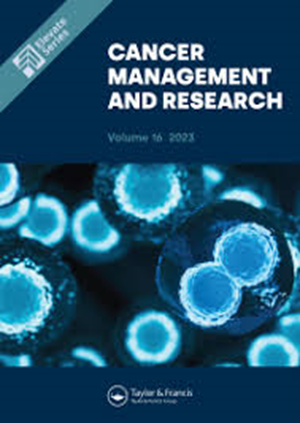Efficacy and Safety of Re-Challenging PD-1 Inhibitors in Second-Line Treatment in Metastatic Nasopharyngeal Carcinoma Previously Treated with Chemotherapy and PD-1 Inhibitors
IF 2.6
4区 医学
Q3 ONCOLOGY
引用次数: 0
Abstract
Background: We aim to evaluate the efficacy and safety of anti-PD1 rechallenge in combination with chemotherapy in patients with metastatic nasopharyngeal carcinoma (mNPC) who have progressed on prior anti-PD1 therapy.Patients and Methods: We enrolled patients with mNPC who received chemotherapy combined with PD-1 immune-checkpoint inhibitors (ICIs) or chemotherapy alone after prior progression of anti-PD1 therapy. The primary endpoint was progress-free survival (PFS), and the secondary endpoints included overall survival (OS), disease control rate (DCR) and objective response rate (ORR).
Results: A total of 96 patients were eligible between January 2015 and December 2020. Thirty-seven (38.5%) were in the PD-1 ICIs re-challenge group, while the remaining 59 patients (61.5%) were in the chemotherapy group. The ORR and DCR of PD-1 ICIs group and chemotherapy group were 37.8% vs 23.7% and 86.5% vs.74.5%, respectively. After a median follow-up period of 21.1 months (IQR 16.1– 28.7), the log-rank analysis demonstrated a significantly improved PFS in the PD-1 ICIs re-challenge group compared to the chemotherapy group (8.4 months [95% CI 4.3– 14.0] vs 5.0 months [95% CI 2.8– 7.2], P = 0.03). However, no significant difference in OS was observed between the two groups (28.3 vs 24.1 months, P = 0.09). The two groups had similar adverse reactions, but the incidence of grade 3 or 4 thrombocytopenia was significantly higher in the PD-1 ICIs re-challenge group (18.9% vs 3.4%, P = 0.025).
Conclusion: mNPC patients who progressed from prior anti-PD1 therapy could benefit from the anti-PD1 rechallenge in combination with chemotherapy. However, further validation is needed.
在既往接受过化疗和 PD-1 抑制剂治疗的转移性鼻咽癌的二线治疗中再次挑战 PD-1 抑制剂的有效性和安全性
研究背景我们旨在评估抗PD1再挑战联合化疗对既往抗PD1治疗进展的转移性鼻咽癌(mNPC)患者的疗效和安全性:我们招募了接受化疗联合PD-1免疫检查点抑制剂(ICIs)或单独化疗的mNPC患者。主要终点是无进展生存期(PFS),次要终点包括总生存期(OS)、疾病控制率(DCR)和客观反应率(ORR):2015年1月至2020年12月期间,共有96名患者符合条件。PD-1 ICIs再挑战组有37人(38.5%),其余59人(61.5%)为化疗组。PD-1 ICIs组和化疗组的ORR和DCR分别为37.8% vs 23.7%和86.5% vs.74.5%。中位随访期为21.1个月(IQR 16.1- 28.7),对数秩分析显示,与化疗组相比,PD-1 ICIs再挑战组的PFS显著改善(8.4个月 [95% CI 4.3- 14.0] vs 5.0个月 [95% CI 2.8- 7.2],P = 0.03)。不过,两组患者的 OS 无明显差异(28.3 个月 vs 24.1 个月,P = 0.09)。两组患者的不良反应相似,但PD-1 ICIs再挑战组的3级或4级血小板减少发生率明显更高(18.9% vs 3.4%,P = 0.025)。然而,还需要进一步的验证。
本文章由计算机程序翻译,如有差异,请以英文原文为准。
求助全文
约1分钟内获得全文
求助全文
来源期刊

Cancer Management and Research
Medicine-Oncology
CiteScore
7.40
自引率
0.00%
发文量
448
审稿时长
16 weeks
期刊介绍:
Cancer Management and Research is an international, peer reviewed, open access journal focusing on cancer research and the optimal use of preventative and integrated treatment interventions to achieve improved outcomes, enhanced survival, and quality of life for cancer patients. Specific topics covered in the journal include:
◦Epidemiology, detection and screening
◦Cellular research and biomarkers
◦Identification of biotargets and agents with novel mechanisms of action
◦Optimal clinical use of existing anticancer agents, including combination therapies
◦Radiation and surgery
◦Palliative care
◦Patient adherence, quality of life, satisfaction
The journal welcomes submitted papers covering original research, basic science, clinical & epidemiological studies, reviews & evaluations, guidelines, expert opinion and commentary, and case series that shed novel insights on a disease or disease subtype.
 求助内容:
求助内容: 应助结果提醒方式:
应助结果提醒方式:


